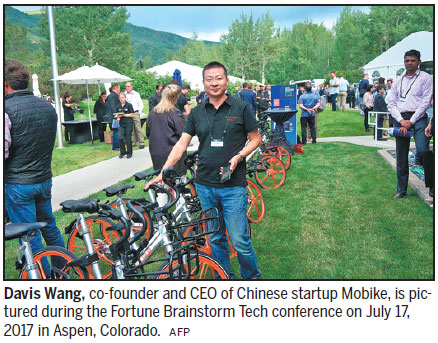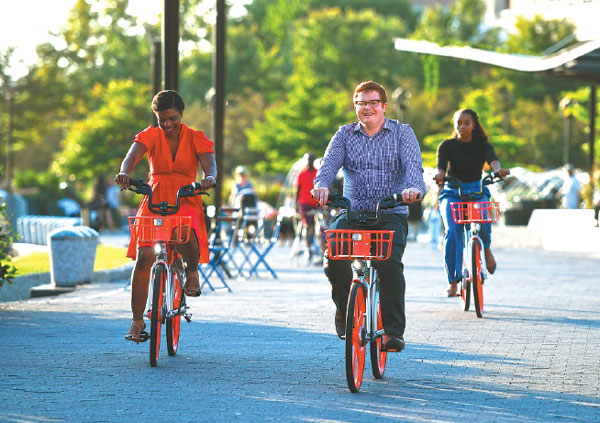Forging partnerships for affordable transportation
Shared-bike provider Mobike to team up with cities for lead in the US
WASHINGTON - China's bike-sharing company Mobike created a buzz when distributing its dockless orange-and-silver bicycles in US capital Washington in September.
It hopes to fill a gap for the city's public transportation network with an easy-to-use option.
When local residents used Mobike for the first time, they found it not only light and easy to ride but convenient to register, locate, unlock and pay for the service with a user-friendly mobile app.
Featuring smart-lock technology, a built-in GPS sensor, and almost a fix-free body, Mobike has at least taken a successful appearance.
|
People ride Mobikes on a street in Washington by renting them at $1 for half an hour. Yin Bogu / For China Daily |
Washington officials said they welcomed Mobike as the city's first dockless bike-sharing program and spoke highly of its technology-driven operations that use real-time trip and city data, including traffic and weather, to allocate its fleet to serve both users and the city.
But the real test has not yet begun.
Mobike, one of China's largest bike-sharing platforms, is facing competition from both the city's years-old subsidized Capital Bikeshare program and home-grown dockless bike-share operators.
Launched in 2010 with 400 bicycles at 49 stations, Capital Bikeshare has since expanded into the largest regional bike network that currently has 3,700 bikes at 440 stations in Washington metropolitan area.
Peak demand is considered a major problem for the public-private partnership as its users often find empty bike-sharing stations in the neighborhood and no open docks to park in downtown during rush hours.
While Mobike is set to address the dock problem with the dockless solution, it is not enjoying the market alone as San Francisco-based Spin, also self-funded, is entering the US capital, with California-based LimeBike to follow suit.
They charge $1 for a 30-minute ride, half the price of the service provided by Capital Bikeshare. A cheaper price would play a key role in attracting the first group of users.
Though locking a dockless bike is no longer causing headaches, getting cyclists to park it in authorized areas is yet another challenge for both Mobike and its rivals.
City officials, business owners, and residents said they don't see bikes piling up in sidewalks and clogging streets, a troubling scene usually observed in cities with a mass distribution of dockless-sharing bikes.
It is an unwanted scenario in Washington, which values its city appearance very much.
A combined number of only hundreds of dockless bikes run by Mobike and Spin are unlikely to be a public nuisance in downtown, but the companies promised to have hands on the ground to ensure that those bikes are legally and neatly parked.
Jillian Irvin, Mobike's US head for government affairs, told Xinhua that Mobike uses data sent by smart locks and GPS to manage and redistribute the fleet on real-time demand and usage.
It also encourages users to park bikes in designated and most-needed areas with a financial incentive. The practice has proved successful in China where Mobile operates some 5 million smart bikes.
Washington has had no regulations for Mobike and other bike-sharing service providers. City authorities give them half a year to test the services before working out rules to address problems that could pop out.
Luke Schoen, Mobike's senior manager of international communications, said the company, with operations in 180 cities worldwide, has a rich experience of managing shared bikes, some of which can be useful, constructive in rolling out its strategy in Washington.
Meanwhile, the company is looking at something bigger. According to Rachel Song, general manager of Mobike US, the Chinese tech company is also working with some other cities across the country.
Mobike is confident that the Washington pilot will be the first of many partnerships that allow the company to "make cycling the most convenient and affordable choice for transportation all around America," she said.
Ofo bicycles roll into four more countries
TIANJIN - Chinese bike-sharing company Ofo celebrated World Car Free Day on Sept 22, by announcing its planned forays into four more European countries.
Ofo plans to enter five cities in the Czech Republic, Italy, Russia and the Netherlands by early 2018, with Prague and Milan the first cities to launch the service.
A 30-minute ride will cost 0.5 euro (59 cents) in these two cities. The three other cities will be Moscow, Rotterdam and Groningen.
The company has also expanded its services to the Thai tourist resort island of Phuket in September, after it entered Thailand in July.
So far, Ofo has announced services in a total of 13 countries around the world.
"We are delighted to announce our entry into these countries on World Car Free Day," said Dai Wei, Ofo's founder and CEO. "Ofo is devoted to offering green, convenient short trip solutions to every city in the world. We hope people everywhere can ride an Ofo (bicycle) and contribute to the protection of global environment."
Xinhua

(China Daily 10/16/2017 page14)


